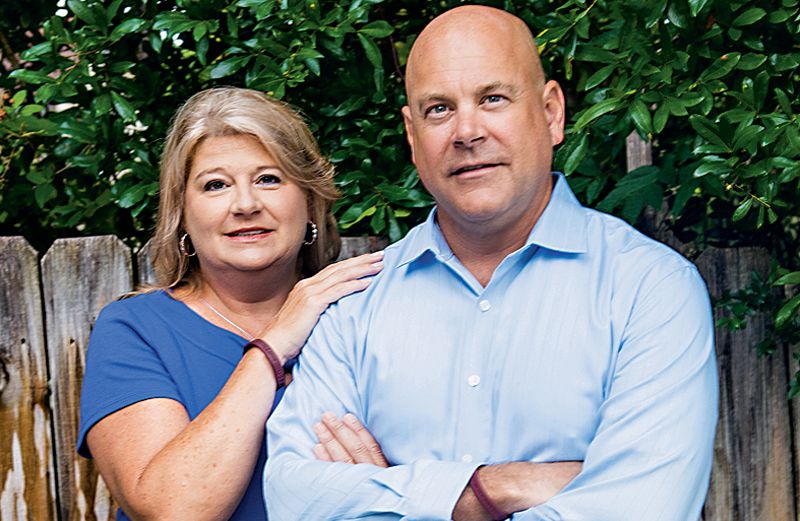My cell phone buzzed. I glanced at the screen. My wife, Kathy. Taylor, our 15-year-old son, must have scored a touchdown in his first game as wide receiver for the Niceville High School Eagles.
It was the 2008 Kickoff Classic, a late-August preseason matchup. Still, for T, it was huge. People here in the Florida Panhandle turn out for two things: football and church.
I hated not being there. The only game of T’s that I’d ever missed. But I let the call go to voice mail. I was up to my neck in problems, 100 miles away in Mobile, Alabama. A National Guard Reservist, I was helping oversee preparations for Hurricane Gustav.
If there’s one thing I know, it’s how to respond to a crisis. Even my job, as a financial advisor, was all about managing risk.
My phone buzzed again. Wow. T must really be doing great. In my mind I could see him going up for a catch, coming down with the ball in the end zone. Another call. And another. Finally, I picked up. A friend on the other end.
“T’s been hurt and he’s at the hospital,” he said. “You need to come home.”
I hung up and requested permission to leave. I called Kathy. She was crying so hard I could barely understand her. “Just hurry. Please.”
Kathy and I had talked about the risks of our only child playing football, especially with recent revelations about concussions and brain damage. But there was nothing T loved more on this earth. He carried a football everywhere he went. He even slept with it.
Besides, T was a tough kid. When he’d broken his wrist, it was days before he mentioned the pain. I couldn’t imagine his injury today was that serious. I just hoped he wouldn’t have to sit out the season.
Someone from the hospital staff met me at the ER. “Your son has multiple lacerations of the liver,” he said. “He’s in surgery now.” I would have collapsed had the staffer not held me up. I’d served in Afghanistan. Seen terrible injuries. I knew a damaged liver could be fatal.
Dear God, don’t let my son die, I prayed. God was a father himself. He would understand how urgent this was. But by morning T was dead. A freak accident. Going up for a pass he’d been hit from both sides. His abdomen was unprotected.
“We almost never see this kind of injury in athletics, more in high-speed car accidents,” the surgeon said.
I felt like I was sleepwalking through the weeks that followed. Some days I didn’t get out of bed. T’s English teacher gave us an essay T had written. We used it as a eulogy at his funeral. “A motto for me is plain and simple,” he wrote. “Never give up. Don’t ever quit.”
That was T. Always pushing himself. He wasn’t a natural athlete. What he lacked in talent he made up for in passion and persistence. He was always the last to leave practice. Then he’d come home and I’d throw passes while he ran routes until it was too dark to see.
“You have to put yourself in position to make the catch,” I’d said, telling him that advice would serve him well later in life. Now he’d never have a chance to live out his life, his dreams of going to the University of Florida, playing football for the Gators like his hero, Tim Tebow, their Heisman-winning quarterback.
Sometimes, I’d go into his room and sit, look at the walls he’d painted Gator orange and blue, his Tebow posters, his trophies, and I’d miss my son with an ache so deep I didn’t think it would ever go away.
Kathy and I barely spoke. What was there to say? Our family ritual, watching football on TV together, seemed empty without T. It felt wrong to try to live a normal life. There was no one I wanted to see. Nothing I wanted to do.
I didn’t even go to work. The stock market was in free fall. I didn’t care. The other advisors in my office covered for me. Even at church, it felt like I was just going through the motions, like God was at a distance, or not there at all.
One day the principal from T’s school called. “The students have been selling wristbands and shirts, raising money in Taylor’s memory and, well, we’re not sure what to do with it.”
Until then, it hadn’t really registered that there were others grieving for T. People who wanted to keep his memory alive. Wasn’t that what I wanted? We could start a nonprofit. I had clients who knew how to do that. A way to ensure that the money would be used for a good cause. But what, exactly?
Kathy and I met with the students. They wanted to give out college scholarships to athletes who, like T, exemplified perseverance. I liked that idea. We put together a board and came up with selection criteria. Then someone called from a regional sports association. They wanted to name an award for T.
That year they were also honoring Tim Tebow. Tebow would present the first Taylor Haugen trophy, engraved with his words: Don’t Quit, Never Give Up!
Things got crazy after that. ESPN did a story. The phone rang night and day. It was overwhelming. Everyone asked about that night we’d lost T. There was no escape from my grief.
EvoShield, a sports-equipment manufacturer in Georgia, made a presentation to our board.
“We’ve created a lightweight protective shirt that shields athletes’ abdominal organs,” the spokesman said. “There hasn’t been as much interest from high schools as we’d hoped. There’s a feeling that these kinds of injuries are rare.”
They’re rare until they happen to your child, I thought. If only T had been wearing one of those shirts.
Beside me Kathy busily took down notes. “This is something we could really get behind,” she said later. I knew she was just trying to move forward. But the idea of taking on another project made my head and heart ache. Thankfully she let the subject drop.
As the months dragged by, I forced myself to go back to work. To go along when Kathy arranged to meet up with friends. In T’s room, we kept his team jersey and a framed picture of him in his football uniform. But going in there only reminded me that there was nothing I could do to bring him back.
One Sunday in 2011 I saw a headline in the newspaper’s sports section: “South Walton QB Injured.” Then I came to the words “A hospital spokesman said his liver was lacerated.” I felt my hands clench. Not again, I thought.
Two weeks later there was another story. A player from an area high school was clinging to life, his spleen ruptured.
No! I thought. I don’t want another parent to go through what we’ve been through! I remembered the EvoShield presentation. People, schools, needed to know about those protective shirts. I could help get the word out.
It wasn’t my idea, but God’s. He too had lost his only son. He, more than anyone, knew how badly I was hurting, how desperately I needed to find meaning and purpose in my loss. T wouldn’t have given up in the face of grief. I couldn’t either.
I found Kathy. “Remember that EvoShield presentation?” I said. “You were right. We ought to give them a call.” Kathy looked at me for a long moment, then wrapped her arms around me. She knew I’d finally turned a corner.
In the last three years, Kathy and I have met with school athletic directors across the Florida Panhandle. Our message is simple: Abdominal injuries are more common, and more dangerous, than people realize, but protection is available.
Today, more than 1,400 high school and middle school football players in our area wear protective shirts. That’s a legacy T would be proud of. He would never want us to give up.
Download your FREE ebook, True Inspirational Stories: 9 Real Life Stories of Hope & Faith.





